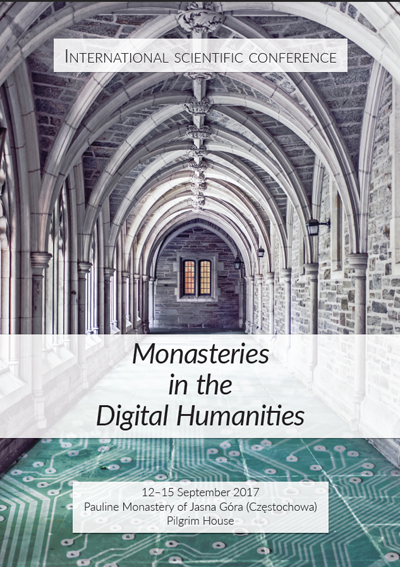
- akce již proběhla.
Monasteries in the Digital Humanities

The conference is organised by the Friends of History Society in Wrocław, Branch of the Polish Historical Society, in collaboration with the Institute of History, University of Wrocław, Institute of History, University of Opole, and the Benedictine Abbey of Tyniec.
Topics:
- Presentation of the history of monasteries and religious orders on the internet (monasticons, portals and blogs, websites, databases, maps etc.).
- Digital reconstruction of former monasteries, virtual monastery libraries, utility rooms in monasteries etc.
- Digitisation of the written legacy of monasteries.
- Creation of platforms providing information and bringing together scholars researching monasteries.
- Dissemination of knowledge of monasteries and religious orders online.
- Possibilities of creating an online monasticon encompassing monasteries located both in Europe (including Poland) and other parts of the world.
- Digital tools and resources in humanities research. Problems – solutions – proposals.
11 September (Monday)
Afternoon and evening: Arrival of participants
2000 Dinner (Restaurant in the Pilgrim House)
12 September (Tuesday)
700–930 Breakfast (in restaurant in the Pilgrim House, from 12 til 16 September)
830–930 Registration of participants (The entrance hall in the Pilgrim House)
930–940 Opening ceremony (Chapel in the Pilgrim House)
- State of research
940–1000 Juliusz Raczkowski (Nicolaus Copernicus University in Toruń), Poland), Digital humanities in Poland. Possibilities, opportunities and threats
1000–1020 Arvydas Pacevičius (absent), Vigintas Stancelis (Vilnius University), Lithuania), Digitisation and communication of documental heritage of monasteries in Lithuania: current state and prospects
1020–1040 Maksymilian Kuśka (John Paul II Pontifical University in Cracow; Archives and Library of the Brothers Hospitallers in Cieszyn, Poland), Digitalisation of archive records in monasteries of the Brothers Hospitallers of Saint John of God in Poland – current state and prospects
1040–1100 Discussion
1100–1130 Coffee Break
- Monastic presence online
1130–1150 Isabelle Jonveaux (University of Graz, Austria; École des hautes études en sciences sociales, France), Reception of monastic presence online. Expectations, critics and online experience
1150–1210 Marcin Jewdokimow (Cardinal Stefan Wyszyński University in Warsaw, Poland), Autopresentations of monks and presentations of Benedictine monasteries – a visual analysis of selected web-sites
1210–1230 Laszlo Ferenczi (Central European University in Budapest, Hungary), The Cistercian network and social network analysis – building a database
1230–1250 Father Aleksander Krzysztof Sitnik (Franciscans Observants Monastery in Cracow, Poland), Popularisation of knowledge of monasteries of the Franciscan Observant Monks and Nuns in Poland online
1250–1320 Discussion
1330–1430 Lunch (Restaurant in the Pilgrim House)
III. Institutions
1500–1520 Peter Heyrman (absent), Joris Colla (KADOC-Documentation and Research Centre for Religion, Culture and Society, Katholieke Universiteit Leuven, Belgium), Towards a digital research infrastructure on the history of 19th– and 20th-century religious institutes in Flanders/Belgium. The contextual web database ODIS, the catalogues and the digital repository of KADOC, the Documentation and Research Centre for Religion, Culture and Society of KU Leuven – Catholic University of Leuven
1520–1540 Bärbel Kröger (Germania Sacra, Göttingen Academy of Sciences, Germany), A database of monasteries, convents and collegiate churches of the Old Empire. Germania Sacra online
1540–1600 Geert Van Reyn (Katholieke Universitit Leuven, Belgium), The digital component of the study and documentation centre ”Capuchins in the Low Countries”
1600–1620 Hildegard Herrmann-Schneider (RISM Tirol-Südtirol & OFM Austria, Institut für Tiroler Musikforschung, Innsbruck, Austria), Music sources of Tyrolean monasteries on the internet (short paper]
1620–1650 Discussion
1650–1720 Coffee Break
- Websites
1720–1740 Maria Rottler (University of Vienna, Austria), Blogging about the history of monasteries and religious orders: the multi-author blog “Ordensgeschichte“
1740–1800 Kateřina Charvátová (Charles University in Prague, Czech Republic), Radka Těšínská-Lomičková (Prague, Czech Republic), The website “Klášterní stezky” (“Monastic itineraries”)
1800–1820 Yannick Van Loon (Katholieke Universiteit Leuven, Belgium), Jesuitica.be: the growth of a virtual research porta
1840–1900 Discussion
1930 Ceremonial dinner (Restaurant in the Pilgrim House)
13 September (Wednesday)
- Projects: generals
1000–1020 Noëlle Deflou-Leca (Grenoble Alps University, France), The COLÉMON platform: a digital corpus of geolocated monasteries and churches of the Middle Ages
1020–1040 Janet Burton (University of Wales Trinity St David, United Kingdom), Karen Stöber (University of Lleida, Spain), Medieval monasticism in a digital age: the Monastic Wales Project
1040–1100 Felicita Tramontana (Marie Skłodowska-Curie Fellow, University of Warwick, United Kingdom), Digital tools, monasteries and early modern mobility
1100–1120 Georg Vogeler (Graz University, Austria), Monasterium.net. Towards a virtual research environment for monastic history
1120–1210 Discussion
1210–1240 Coffee Break
- Projects: dissolutions
1240–1300 James G. Clark, Charlotte Tupman (University of Exeter, United Kingdom), The digital Dissolution: developing new critical and comparative perspectives on the end of monasticism in Europe
1300–1320 Marek Derwich (University of Wrocław, Poland), The project “Cultural heritage of dissolved monasteries on the territory of former Poland and in Silesia in 18th and 19th century: fate, significance, cataloguing” and monasteries in Poland online
1320–1340 Marek Wójcikowski, Szymon Sztajer (Razor s.c., Wrocław, Poland), Challenges involving in designing a web application for cataloguing and publishing historical data, as exemplified by the Hereditas Monasteriorum Knowledge Portal (pw.kasaty.pl)
1340–1400 Discussion
1410–1510 Lunch (Restaurant in the Pilgrim House)
VII. Projects: GIS
1520–1540 Xavier Costa Badia (University of Barcelona, Spain), Monasteries in time and space: the possibilities of GIS for mapping spiritual landscapes in the Early Middle Ages
1540–1600 Jan Kremer (CKS-Centre for Medieval Studies in Prague, Czech Republic), Medieval Benedictine foundations in Central Europe: development and perspectives of the database and GIS project
1600–1620 Johnny Grandjean Gøgsig Jakobsen (University of Copenhagen, Danemark), “KlosterGIS DK” and “Diplomatarium OP Dacie” online
1620–1640 Discussion
1640–1710 Coffee Break
VIII. Projects: architecture
1710–1730 Anna Bojęś-Białasik (Cracow University of Technology, Poland), Digital techniques in architectural research of monasteries
1730–1750 Anna Bojęś-Białasik (Cracow University of Technology, Poland), Marcin Szyma (Jagiellonian University in Cracow, Poland), 3D scanning and digital reconstructions as a method of architectural research of mendicant monasteries in Kraków
1750–1810 Aurelio Stoppini, Raffaella Brigante (absent) Andrea Brozzi (absent), Fabio Radicioni (absent) University of Perugia, Italy), The Monastery of San Mamiliano at the Montecristo island: geomatic technologies from surveys to a 3D model
1810–1830 Marcin Szyma, Marek Walczak (Jagiellonian University in Cracow, Poland), Mapping the Dominican Convent in Cracow
1830–1850 Eduardo Carrero Santamaría (Autonomous University of Barcelona, Spain), Monasteries Santes Creus and Piedra. A project on Cistercian architecture, liturgy, sound and digital humanities
1850–1930 Discussion
2000 Dinner (Restaurant in the Pilgrim House)
14 September (Thursday)
- Projects: female monasticism
900–920 Delfina Isabel Nieto Isabel (University of Barcelona, Spain), Spiritual landscapes: a digital doorway to female monasticism in medieval Iberia
920–940 Sebastian Roebert (Leipzig University, Germany; University of Barcelona, Spain), “Claustra” and “Paisajes espirituales”: cartography of female monasticism in the Iberian Peninsula and the Western Mediterranean
940–1000 Bronagh Ann McShane (RECIRC, National University of Ireland in Galway, Ireland), Digitaly mapping the reception and circulation of female-authored texts among Catholic religious orders across Europe
1000–1020 Discussion
1020–1050 Coffee Break
- Projects: libraries
1050–1110 Hannah Busch (Trier Center for Digital Humanities, Germany), Virtual exploration of the mediaeval library of St. Matthias in Trier
1110–1130 Renáta Modráková (National Library of Czech Republic in Prague), The reconstruction of former Czech Benedictine monasteries libraries in Manuscriptorium Digital Library
1130–1150 Markéta Holubová (Czech Academy of Sciences in Prague, absent: relator: Jan Zdichynec (Charles University in Prague, Czech Republic)), Rekonstruktion der Bibliothek der Jesuitenresidenz in Mariaschein (Bohosudov) bei Teplitz
1150–1210 Discussion
1210–1240 Coffee Break
- Projects: archives
1240–1300 Sarah Barthélemy (Université catholique de Louvain-la-Neuve, Belgium), Managing archives with basic MS Access databases
1300–1320 Sister Gabriele Ausra Vasiliauskaitė (Universitetas Vytautas Magnus University in Kaunas, Lithuania), Review of existent documents in archive of Benedictine monastery of Kaunas
1320–1330 Iwona Pogorzelska, Iwona Rogowska (State Archives in Kielce, Poland), Monastic sources online in the States Archives in Poland
1330–1350 Discussion
1400–1500 Lunch (Restaurant in the Pilgrim House)
XII: Projects: manuscrits
1530–1550 Michael B. Toth (University College London, United Kingdom), Dispersed manuscript leaves offer new digital insight into monastery legacy
1550–1610 Maria Stieglecker (Austrian Academy of Sciences in Vienna, Austria), Building Bridges. Watermarks and the network of monastic manuscript production
1610–1630 Matija Ogrin (Research Centre of Slovenian Academy of Sciences and Arts in Ljubljana, Slovenia), The Capuchin convent of Škofja Loka and the related manuscripts of Slovenian Baroque literature. An approach in Digital Humanities
1630–1650 Stephan Lauper (University of Freiburg, Switzerland), The manuscripts of the commandery of St. John “Zum Grünen Wörth” in Strasbourg
1650–1720 Discussion
1720–1750 Coffee Break
XIII. Projets: editions
1750–1810 Tobias Hodel (University of Zurich, Switzerland), Connecting charters and chartularies: the digital edition of the Königsfelden Abbey – approaching documentary practices
1810–1830 Irene Rabl (University of Vienna, Austria), The letters of the Pez correspondence: a transforming edition
1830–1850 Maria Rottler (University of Vienna, Austria), Roman Zirngibl, a Benedictine in St. Emmeram, historian and archivist: a digital scholarly edition of his diaries, letters and monthly reports
1850–1910 Anastasia Preobrazhenskaya (Higher School of Economics in Moscow, Russia), Simeon of Polotsk: a monk and a poet in the 17th century Muscovy. Building a digitised corpus of monastic writings
1910–1940 Discussion
2000 Dinner (Restaurant in the Pilgrim House)
15 September (Friday)
XIV. Projects: religious
900–920 Rafał Witkowski (Adam Mickiewicz University in Poznań, Poland), From a manuscript necrology to a digital data base. New forms of prosopographic studies based on examples of the monastic communities of the Polish-Lithuanian Commonwealth
920–940 Hedvika Kuchařová (Royal Canonry of Premonstratensians in Strahov; Czech Academy of Sciences in Prague), Kateřina Bobková-Valentová (Czech Academy of Sciences in Prague), The bio-bibliographical database of members of the religious order living in the Czech lands in the Early Modern Age
940–1000 Zsuzsa Pető (Central European University in Budapest, Hungary), The hermits of the king, the hermits of the people: Pauline monastic space in the Carpathian Basin until the mid-fifteenth century
1000–1020 Discussion
1020–1050 Coffee Break
Workshop 1
1100–1230 Tobias Hodel (Historisches Seminar, University of Zurich, Switzerland), READ: Read manuscripts with Transcribus [read.transkribus.eu; READ = Recognition and Enrichment of Archival Documents]
1230–1300 Coffee Break
Workshop 2
1300–1430 Michael B. Toth (Honorary Research Associate, University College London, United Kingdom), An Introductory Workshop for Implementing Effective Digitizations
1445–1530 Lunch (Restaurant in the Pilgrim House)
1530–1830 Tour of the Paulin Monastery of Jasna Góra
1930 Dinner (Restaurant in the Pilgrim House)
16 September (Saturday)
After breakfast: Departures



